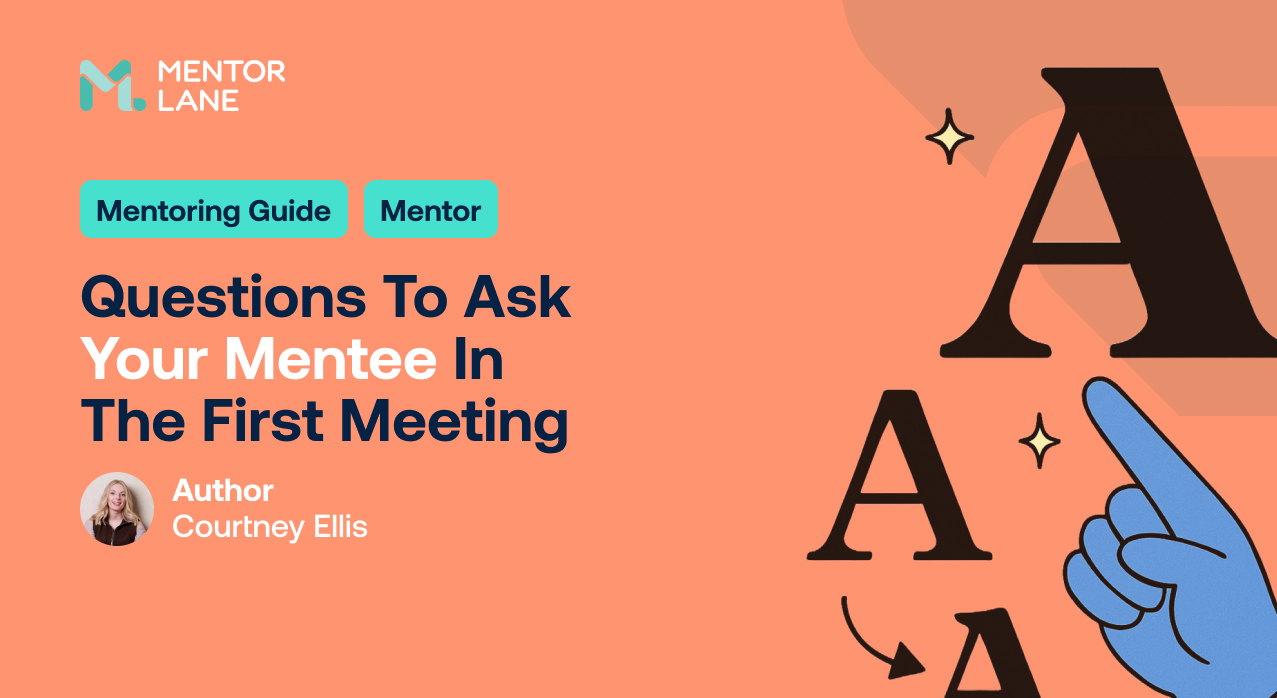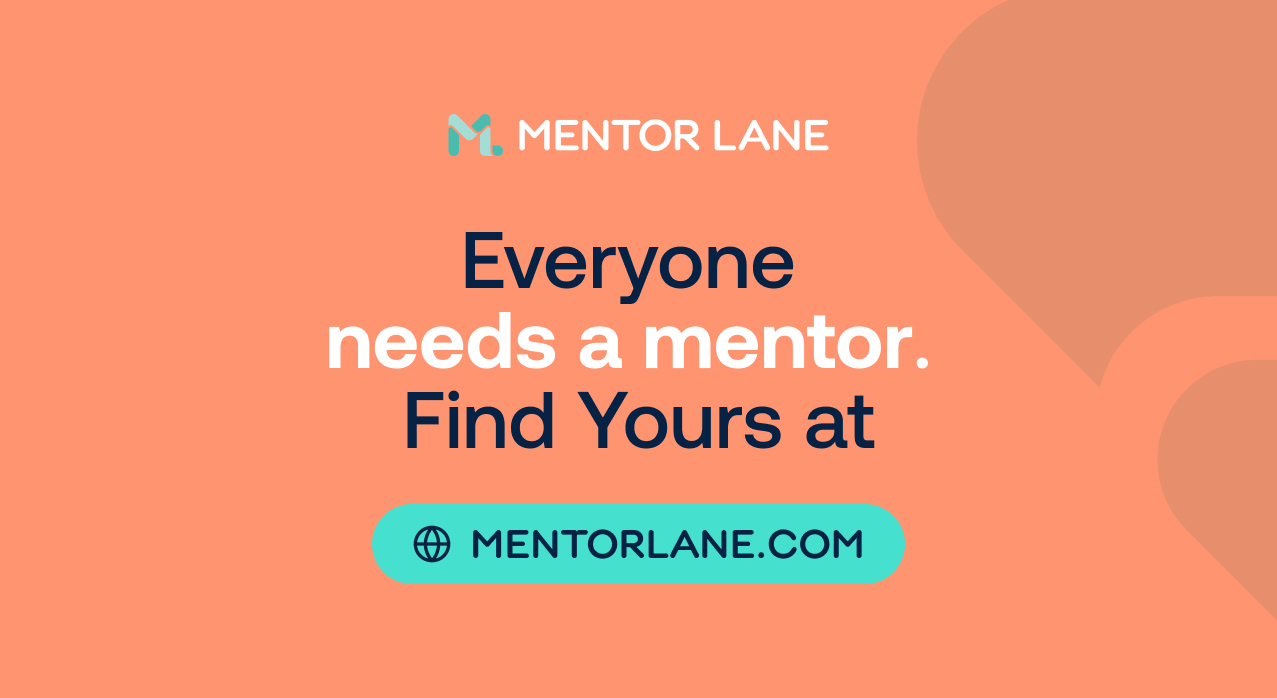News & Updates
22 Aug 08:32
5 min read
Questions to Ask Your Mentee in the First Meeting
Discover key questions for your first mentee meeting that build trust and set the stage for a successful mentoring relationship.

Courtney Ellis
Media Manager

Questions to Ask Your Mentee in the First Meeting
Download Here - Questions to Ask Mentee Guide.pdf
Your first questions determine everything that follows.
The difference between mentoring relationships that thrive and those that stagnate comes down to how you structure your first meeting and the questions you ask.
A lot of mentor relationships emerge naturally. Research shows 61% of successful mentoring relationships emerge organically, 14% begin with someone asking to be mentored.
But whether you were formally asked to mentor someone or the relationship developed organically, all mentorships, even the most natural ones, require thoughtful questions to evolve into effective professional relationships.
Below are five key categories of questions to ask your mentee during your first meeting.
First Impressions
First meetings create the foundation for everything that follows.
The best first mentor-mentee meeting will effectively establish trust, set expectations, and clarify whether both parties feel excited and energised about the relationship ahead.
Most mentors approach initial conversations with good intentions but no real framework. They ask surface-level questions, share their own experiences, and hope chemistry develops naturally.
The main problem with this approach is that it takes an awfully long time.
There is a better way. One that involves asking the right questions in a structured manner that builds trust in a much shorter timeframe. Compressing months of natural evolution into a single strategic conversation.
This allows you as a mentor to start to working on a mentee's goals in a much faster timeframe.
The questions below start with comfortable territory, build rapport through shared professional experiences, then gradually move towards more vulnerable topics like goals, working styles and boundaries.
Category One: Professional Background and Journey
Start with questions that feel safe and familiar. Professional background questions allow mentees to share their story without vulnerability.
These questions establish credibility and help you understand their career trajectory:
What drew you to your current role and how does it fit into your broader career path?
This question reveals motivation, career logic and future thinking. It shows you how they make decisions and if they think strategically about their professional development.
What aspects of your work energise you most and what drains your energy?
Energy patterns indicate natural strengths and potential growth areas. They also reveal what kind of mentoring support might be most valuable.
Tell me about a recent project or challenge that stretched your capabilities.
This uncovers their learning edge and shows how they handle growth opportunities. It also demonstrates their self awareness about skill development. Professional background questions create psychological safety. They position the mentee as the expert on their own experience while giving you insight into their professional identity and growth trajectory.
Category Two: Expectations and Previous Mentoring Experience
Once rapport is established, explore their mentoring expectations and previous experiences. This prevents misaligned assumptions from derailing the relationship later.
What does successful mentoring look like to you?
This reveals their mental model of the mentoring relationship. Some mentees expect directive advice, others want thought partnership and some need accountability structures.
Have you had mentors before, either formally or informally? What worked well and what didn’t?
Previous experiences shape current expectations. Understanding what they valued or disliked helps you adapt your approach to their preferences.
What specific outcomes are you hoping to achieve through our mentoring relationship?
Concrete outcomes create accountability and help you measure progress. They also ensure both parties are investing in the same definition of success.
Expectation alignment prevents the most common mentoring failures. When both parties understand what success looks like, they can design their interactions to achieve it.
Category Three: Goals and Aspirations
With trust established and expectations aligned, you can explore deeper territory around goals and aspirations. These questions reveal what truly motivates your mentee.
Where do you want to be professionally in two to three years and what capabilities will you need to develop to get there?
This question connects current reality to future vision. It helps you understand their ambition level and identify specific skill gaps where you can provide guidance.
What opportunities are you most excited about and what obstacles do you anticipate?
Excitement indicates intrinsic motivation, while anticipated obstacles reveal their strategic thinking and self awareness about potential challenges.
What would you attempt if you knew you couldn’t fail?
This uncovers dreams they might be too cautious to pursue. It often reveals their highest aspirations and can guide conversations about calculated risk taking.
Goal focused questions help you understand what success means to your mentee. They also identify areas where your experience and network might be most valuable.
Category Four: Working Style and Communication Preferences
Understanding how your mentee processes information and prefers to communicate ensures your mentoring style matches their learning style.
How do you prefer to receive feedback and what communication style brings out your best thinking?
Some people thrive on direct feedback, others need more context and encouragement. Understanding their preference helps you deliver guidance in ways they can actually hear and implement.
Category Five: Boundaries and Logistics
End the first meeting by setting clear boundaries and logistics. This creates structure for the relationship long term.
How often should we meet, and what format works best for you?
Frequency and format impact relationship momentum. Some mentees need frequent check-ins, others prefer deeper monthly conversations.
Are there topics or areas where you’d prefer guidance from other sources?
Understanding boundaries prevents overstepping and helps you focus on areas where you can add the most value.
What’s the best way to hold you accountable to the commitments you make?
Accountability structures turn mentoring conversations into action. Understanding their preferred accountability style ensures follow-through on insights and commitments.
Boundary questions create sustainable relationship structures. They establish mutual respect and ensure both parties can maintain the relationship without burnout or resentment.
Don’t skip the boundary conversation. Boundaries create psychological safety and prevent future misunderstandings. They’re especially important for cross-gender or cross-cultural mentoring relationships.
Don’t Try to Cover Everything in one Meeting
If the conversation goes deep in one area, that’s often more valuable than superficially covering all five categories.
The goal is understanding, not completion. Use the framework to guide your conversation, but let genuine curiosity drive the depth and direction.
Building on the Foundation
Your first meeting sets the foundation for everything that follows. When you understand your mentee’s background, expectations, goals, working style and boundaries, you can design subsequent conversations that really serve their development.
These questions eliminate the awkward starting period that kills many mentoring relationships before they get momentum. And since your mentee's career may depend on how well you execute this first meeting, the questions you ask need to make it count.

This post is also available in:
Related Posts
Sales Mentors: A 9-Round Guide to Sales Success with Michael Silberberger
Discover Michael’s 9-round guide to sales success. Learn how sales mentors help you build confidence, resilience, and lasting results.
What to Expect from a Mentor: What My Millionaire Mentor Taught Me
Curious what a millionaire mentor actually teaches? It's not about money tricks, it's mindset. Discover the surprising lessons that transformed Michael's approach to success and life.
How To Become a Mentor in Germany
Ever thought about becoming a mentor? Click here to work out if you're ready to become a mentor, and the steps to take to become a mentor in Germany.



-cd972d86.png)
